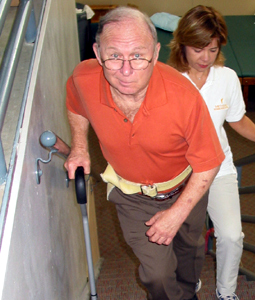JACKSON, Miss.—Eighteen months after suffering a severe stroke, Dr. Faser Triplett of Jackson still celebrates every gain in his abilities, even if it’s as simple as grasping a pill with his left thumb and forefinger.
The achievements bolster Triplett’s belief that all his hard work in therapy is paying off.
But his success also illustrates what research is now revealing—the brain has the capacity to rewire long after a stroke or injury.
“It has recently been proven that you can reactivate existing brain connections and make new connections,” said Dr. Dobrivoje Stokic, director of the Center for Neuroscience and Neurological Recovery (CNNR) at Methodist Rehabilitation Center in Jackson. “So rehabilitation should not be considered only a short-term goal.”
As a physician, Triplett knew his recovery would require committing to the long haul, and he did so with dogged determination.
“He was always early to therapy and waiting for us to finish with our previous patients,” said Methodist physical therapist Kim Willis. “He’s the type patient you enjoy working with because he’s so motivated and has goals for himself.”
“He attacked his therapy the way he has everything else,” said Scotty Dickey, an occupational therapist at Methodist. “He was highly successful at everything else and he has been highly successful at this,”
Triplett said his time at Methodist strengthened his faith in God and made him more appreciative of supportive family, friends and coworkers. It also gave him insight into what can be accomplished when a patient has access to a facility with a dedicated stroke unit.
“It’s the most wonderful thing that could have happened to me,” Triplett said. “You get bright young people who are constantly evaluating what you are doing right and what you still need to be doing. If you really want to do things for a stroke survivor, they ought to be at Methodist. There’s nothing like it in the state.”
Triplett said when he first transferred to Methodist Rehab in May, 2001, he couldn’t even turn over in bed. “It affected my left side and I couldn’t stand up, walk or use my left arm.”
Triplett vowed to leave the hospital on his own two feet. So the first time he navigated a hallway unassisted, he was so happy he sobbed. “I told Kim that was the first time I realized I was going to walk out of here. Then she started crying.”
Now, Triplett goes twice a week to Methodist’s outpatient clinic in Flowood, where Methodist occupational therapist Peggy Kelly and physical therapist Teresa Swyers are working with him to improve his fine motor skills and advance his walking abilities.
“Our goal is to help him return to the activities he participated in prior to his stroke,” Swyers said.
Triplett has already returned to his duties as chairman of the board for Mississippi Medical Assurance Company. And he stays busy with other pursuits, including encouraging other patients who are new to the rigors of rehab.
“When I was in rehab a gentleman who had a stroke three years ago came and talked to us and he was such an inspiration. He was in a wheelchair and went to every Ole Miss football game, went deer hunting and worked as a greeter at Wal-Mart. I told myself if I made it I was going to return as much as I could to people who had strokes, too. I try to tell them how important rehab is and how important it is to work away from rehab.”
Swyers and Kelly said it’s that willingness to do his “homework” that has helped Triplett improve. “He does everything we tell him to do and even comes up with his own activities,” Kelly said.
And she believes that’s how other stroke patients could continue to make gains long after the standard year of recovery. “While everything depends on the extent of the patient’s injury, their participation is important, too,” Kelly said. “I tell people a year is typical, but you may not be typical. That’s why it’s important to follow through at home.”

